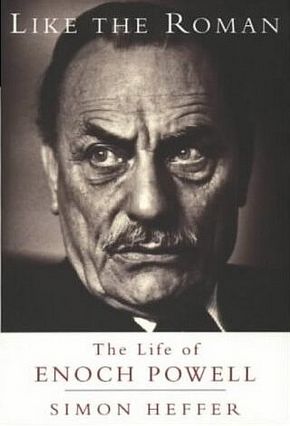Enoch Powell
 From Conservapedia
From Conservapedia Enoch Powell (born John Enoch Powell, June 16, 1912 – February 8, 1998) was a conservative British politician best known for his opposition to multiculturalism and mass migration. While heavily condemned by the political establishment during his lifetime, Powell's warnings have since been realized.[1]
Contents
Career[edit]
Born in Birmingham, Enoch Powell was educated at King Edward's School, Birmingham, then Trinity College, Cambridge. In 1937 he was appointed Professor of Greek at Sydney University at the age of 25. In 1939 he returned to Britain to enlist in the army as a private. Although commissioned on the General List, he was soon transferred to the Intelligence Corps and transferred to Cairo. He was actually fluent in all the languages used by the fighting armies: French, Italian and German. In August 1943 he was posted to Delhi. He developed a passion for India and learnt to speak Urdu. By the end of the war he had risen to the rank of brigadier.
He joined the Conservative Party and started to work for the Conservative Research Department. He was elected to the British Parliament in 1950 as Conservative Member of Parliament for Wolverhampton South West, a constituency he held until 1974. He was Parliamentary Secretary to the Ministry of Housing and Local Government (1955–1957), and Financial Secretary to the Treasury (1957–1958). In 1958 he resigned over public expenditure together with the Chancellor of the Exchequer, Peter Thorneycroft and Nigel Birch. The Prime Minister, Harold Macmillan famously dismissed their action as "little local difficulties". Powell returned to Macmillan's government as Minister of Health (1960–1963) and even entered Cabinet. He declined to serve under Alec Douglas-Home to protest against the way Macmillan handled his succession.
Immigration[edit]
Labour Prime Minister Harold Wilson reversed the Labour Party's traditional policy favouring unrestricted Commonwealth immigration. With an eye on public opinion and election returns, Wilson developed a three-phased race-relations policy, including tightened immigration controls, prohibition of domestic racial discrimination and incitement, and creation of local conciliation and integration mechanisms. His pragmatic, carefully balanced immigration and race-relations policies were in the short run successful, not least because of acquiescence by the opposition Conservative leadership. Racial issues, conspicuous in some urban working-class constituencies in the 1964 general election, were marginalized in the 1966 election. During Wilson's second administration (1966–70), pressure by South Asian immigrants from East Africa and Powell's populist Conservatism rekindled race-related issues.[2]
Powell often warned of the dangers of immigration and multiracialism and their affects on national identity, and was expelled from the shadow cabinet of Conservative Party leader Edward Heath in 1968 after his notoriously inflammatory 'Rivers of Blood' speech. He also opposed Britain's membership of the European Economic Community (EEC) (now the European Union), which he believed undermined British sovereignty.
Working-class support for Powell's speech of 20 April 1968 was widespread, especially among London dockers, who struck in support between 23 and 26 April. One reason given was that Powell was being penalized by the political establishment for daring to say what was commonplace in native working-class communities: that there were too many colored immigrants. This points to a possible explanation for the contradiction between the left-wing attitudes generally associated with dockers and other strongly unionized workers and the overtly right-wing orientation of Powell's discourse. The strikers were showing their confidence in their own ability to act independently of the dominant authority structures of British society, including the established trade union hierarchy and the Labour Party. Racism therefore provides only a reductionist answer and cannot be isolated from other equally important factors in the context of general discontent with the Labour government of the time.[3]
Outsider[edit]
By 1974 Powell was so disillusioned with the Conservative Party policy on the EEC that he decided not to stand as a candidate at the general election and urged the public to vote for the Labour Party, which promised a referendum on the question. For a short while he believed that his political life was over but in October 1974 he was invited to stand as Ulster Unionist Party candidate for South Down, and won the seat. He spent the rest of his parliamentary career until 1987 serving this constituency.
In 1994 he published his translation of St Matthew's Gospel.
See also[edit]
Further reading[edit]
- Simon Heffer. Like the Roman: The Life of Enoch Powell (1999)
References[edit]
- ↑ Kassam, Raheem (2018). Enoch Was Right: 'Rivers of Blood' 50 Years On. Self-published. ISBN 978-1980818823.
- ↑ Dennis Dean, "The Race Relations Policy of the First Wilson Government". Twentieth Century British History 2000 11(3): 259-283 in EBSCO
- ↑ Fred Lindop, "Racism and the Working Class: Strikes in Support of Enoch Powell in 1968." Labour History Review 2001 66(1): 79-100 in EBSCO
External links[edit]
Categories: [British Politicians] [Conservatives] [Nationalists] [1960s] [Former Members of Parliament]
↧ Download as ZWI file | Last modified: 02/16/2023 01:53:13 | 12 views
☰ Source: https://www.conservapedia.com/Enoch_Powell | License: CC BY-SA 3.0
 ZWI signed:
ZWI signed:
 KSF
KSF